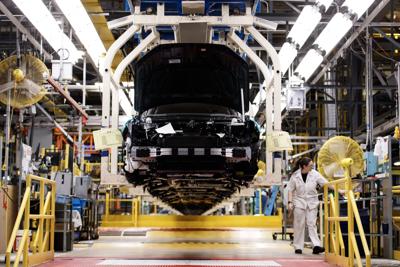After months of intense lobbying from senior automotive executives, U.S. President Donald Trump has signed an order aiming to give auto makers a break on import tariffs, but Canadian industry officials warn that the changes don’t remove the threat to jobs or companies in this country.
The executive order, signed Tuesday afternoon, clarified that auto tariffs and a 25 per cent tariff on parts won’t be “stacked” on top of already-existing import levies, such as those on steel and aluminum. It also said auto makers would be able to apply for a rebate of tariffs paid on some imported automotive parts.
But in the order, and an accompanying proclamation, Trump made it clear he’s still aiming to bring as much automotive production to the U.S. as he can.
President Donald Trump signed executive orders to relax some of his 25% tariffs on automobiles and auto parts, a significant reversal as the import taxes threatened to hurt domestic manufacturers. (AP Video / April 29, 2025)
“It is necessary and appropriate to modify the system of monetary fees and related measures ... to more effectively eliminate the threat imports of automobiles and certain automobile parts pose on the national security of the United States,” Trump said in his proclamation.
Despite the rebates, which will only last for two years, a parts tariff still poses a serious threat to Canadian companies and workers, said the head of an industry association.
“What they’re trying to do is squeeze out, phase out, all foreign content. It’s a slow bleed on everybody,” said Flavio Volpe, CEO of the Automotive Parts Manufacturers’ Association.Ìý
Initially, reports had suggested that parts which comply with Canada-U.S.-Mexico trade agreement rules would be exempt from some tariffs. Volpe said it’s still unclear if that will actually happen, and what the effective rate on parts imports will actually be.
“It’s a hot mess. Everything is unclear, as usual,” said Volpe, who initially used an expletive in place of hot. “Unless there’s another update, we’re headed for a 25 per cent tariff on $100 million worth of Canadian auto parts a day by Saturday.”
The Wall Street Journal first reported some details of the latest tariff order late Monday.
The head of the association representing non-U.S. auto manufacturers in Canada said the new measures don’t fully mitigate the harm caused by tariffs.
“It’s a concern that they’re apparently still planning to bring in a parts tariff,” said David Adams, CEO of Global Automakers of Canada. “The remission might be helpful, but it’s not entirely clear how this will actually work.”
The head of Canada’s biggest private sector union blasted Tuesday’s moves, which came as Trump was headed to Michigan, the heart of the American automotive sector, to mark his 100th day in office.
“President Trump’s announced modification to auto parts tariffs today changes nothing for Canada and Canadian workers,” said Unifor National President Lana Payne. “The U.S. administration is trying to slowly drain the Canadian auto industry of investment and steal away jobs. This is unacceptable. And we will not stand for it.”
The North American automotive industry has been so integrated for so long, that trying to undo it will be a disaster across the continent, said Jim Stanford, chief economist at the Centre for Future Work. A few tweaks to tariffs here and there doesn’t change the bigger picture, Stanford added.
“This is a fruitless and ill-guided attempt to relocate auto jobs to America,” said Stanford. “This will hurt Canadian jobs for sure, in both parts and assembly, but it will also hurt American jobs and that’s the most inexplicable part of this. It’s a murder-suicide for the North American auto industry.”
The partial remission of parts tariffs is merely a panicked attempt to placate U.S. automakers, but it won’t ultimately work because it’s really only window-dressing, said Stanford.
“This announcement is a sign that Trump is under fierce pressure from American auto executives. He wants to throw them a bone while preserving the core of his strategy,” Stanford said.
The head of the Canadian Chamber of Commerce blasted the latest tariff news, saying it adheres to Trump’s chaotic style — and will still damage the entire North American auto industry.
“Whether the U.S. administration likes it or not, we’re in this together, and supply chains don’t heal quickly once broken,” said Chamber CEO Candace Laing.Ìý
The consequences of continued tariffs, said Laing, are clear.
“Tariffs just add taxes to the cost of completed cars, with auto parts and cars moving back-and-forth from facility to facility. The consequences: less employment, domestic and foreign investment, and retirement savings for future retirees,” Laing said.
The announcement came less than a week after Trump threatened to increase auto tariffs for Canada.Ìý
Trump slapped a 25 per cent tariff on all cars and light trucks not made in the U.S., while also hitting automakers with 25 per cent duties on aluminum and steel. Starting Saturday, auto parts are also set to be levied a 25 per cent tariff.Ìý
The Canadian industry received a partial carveout from Trump’s tariffs for vehicles compliant with the Canada-U.S.-Mexico Agreement (CUSMA) on trade. Canada has retaliated with a 25 per cent tariff on American-made cars imported to Canada, along with some carveouts for CUSMA-compliant vehicles.
The five companies that assemble cars in Canada will also be allowed to import a certain number of U.S.-assembled vehicles free of the counter-tariffs.
With files from The Canadian Press



























To join the conversation set a first and last name in your user profile.
Sign in or register for free to join the Conversation